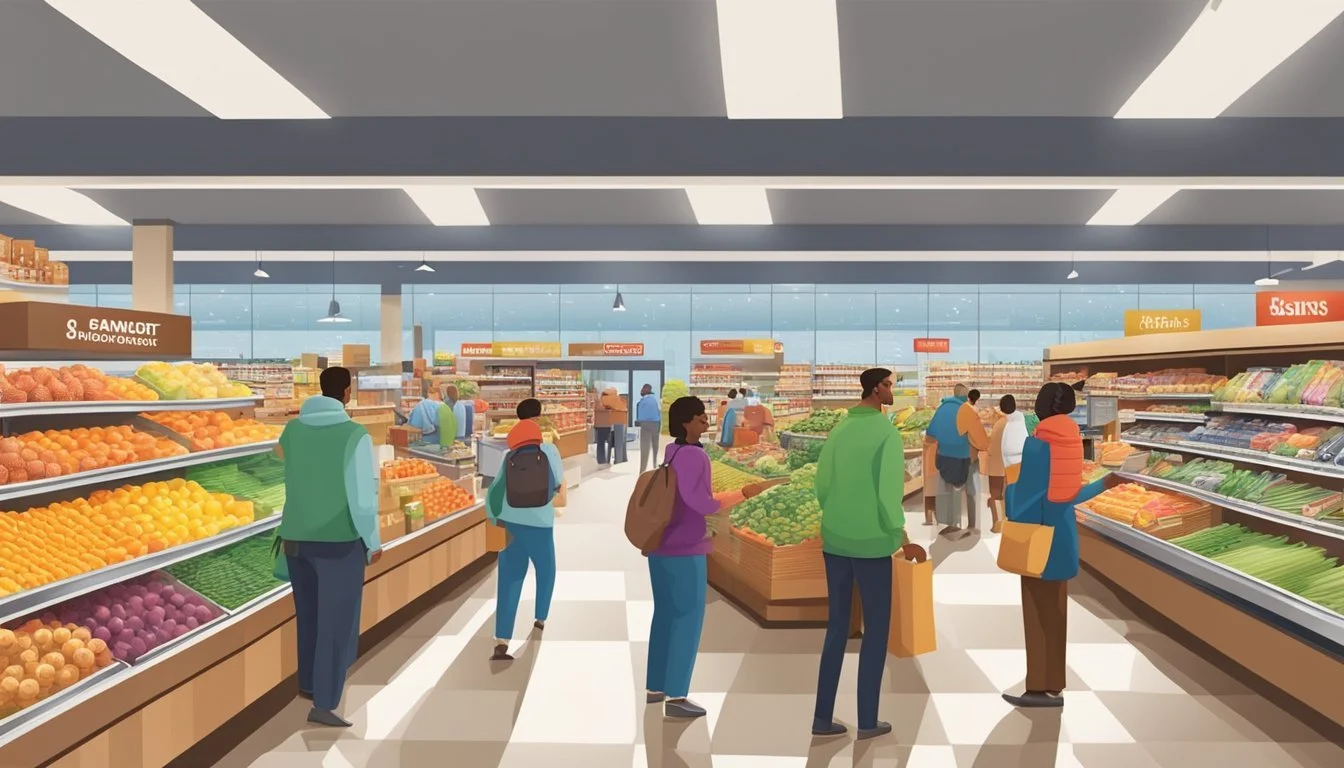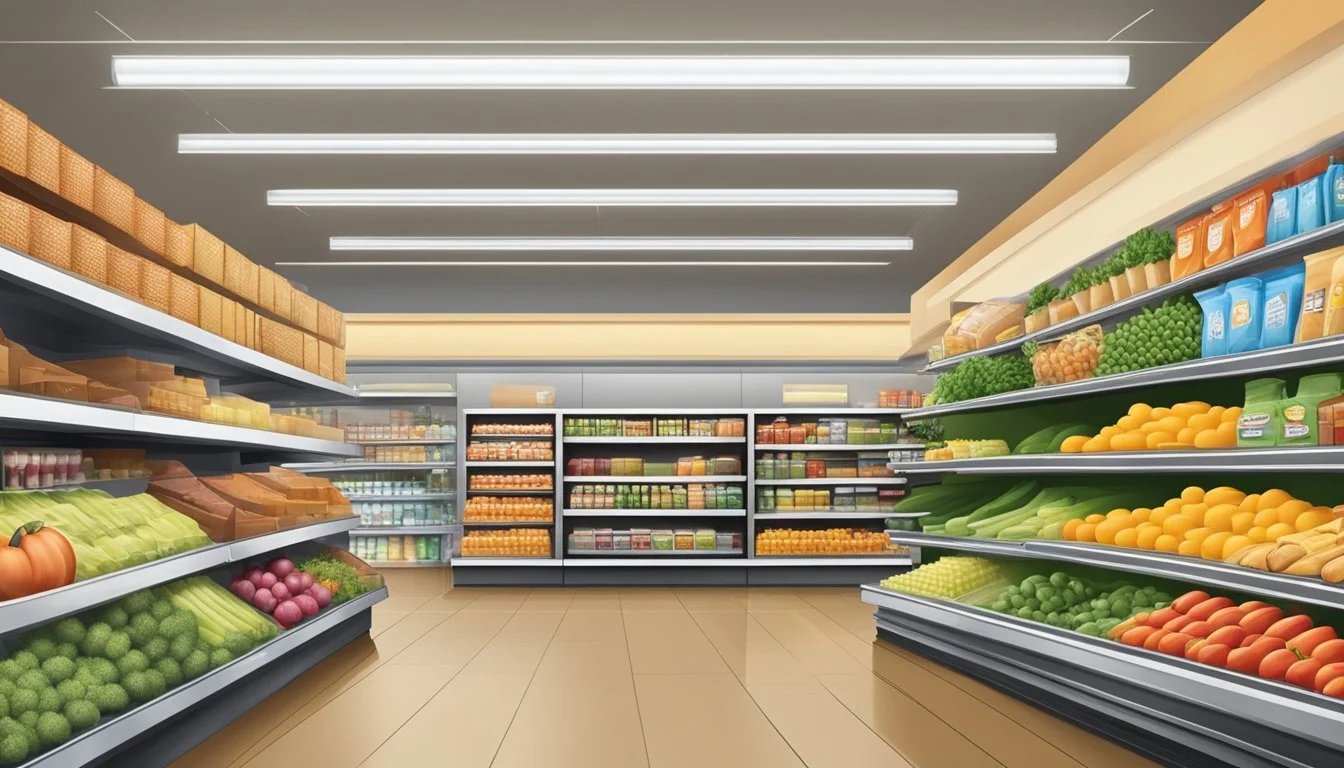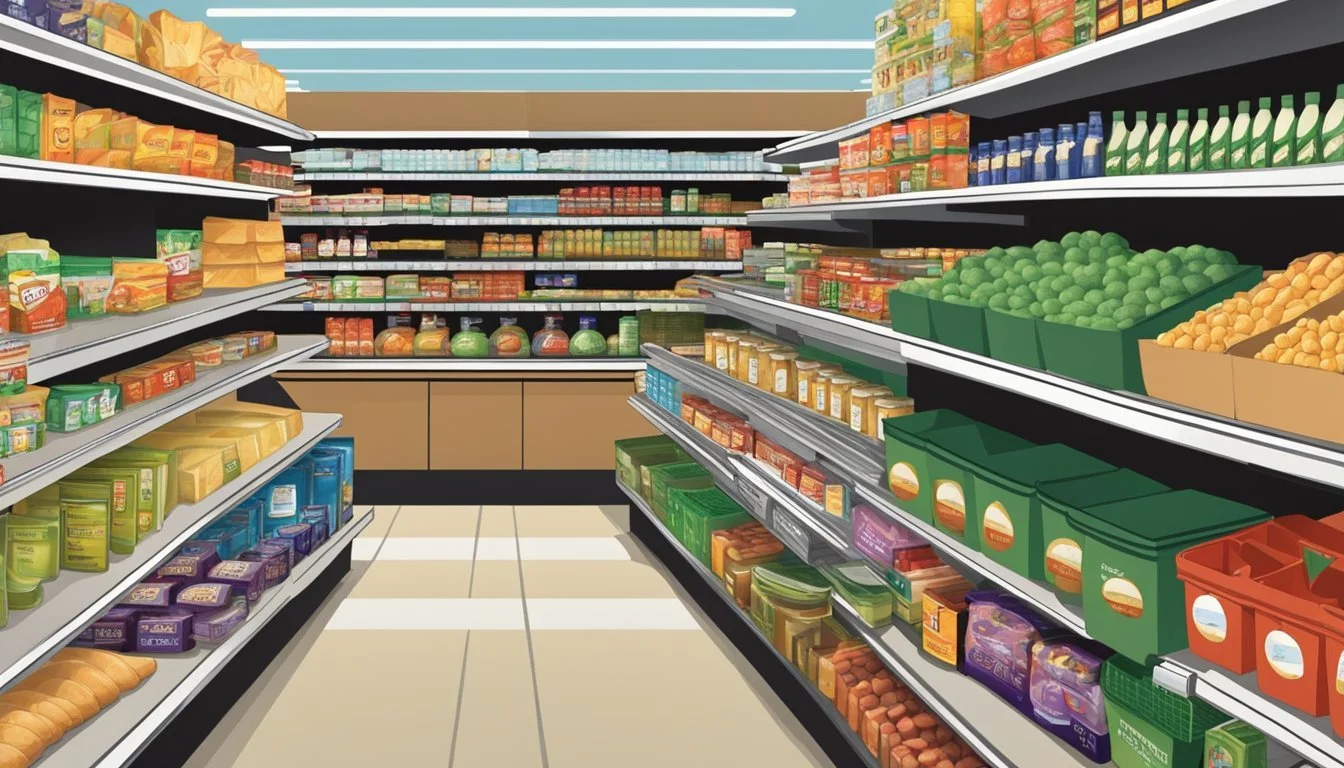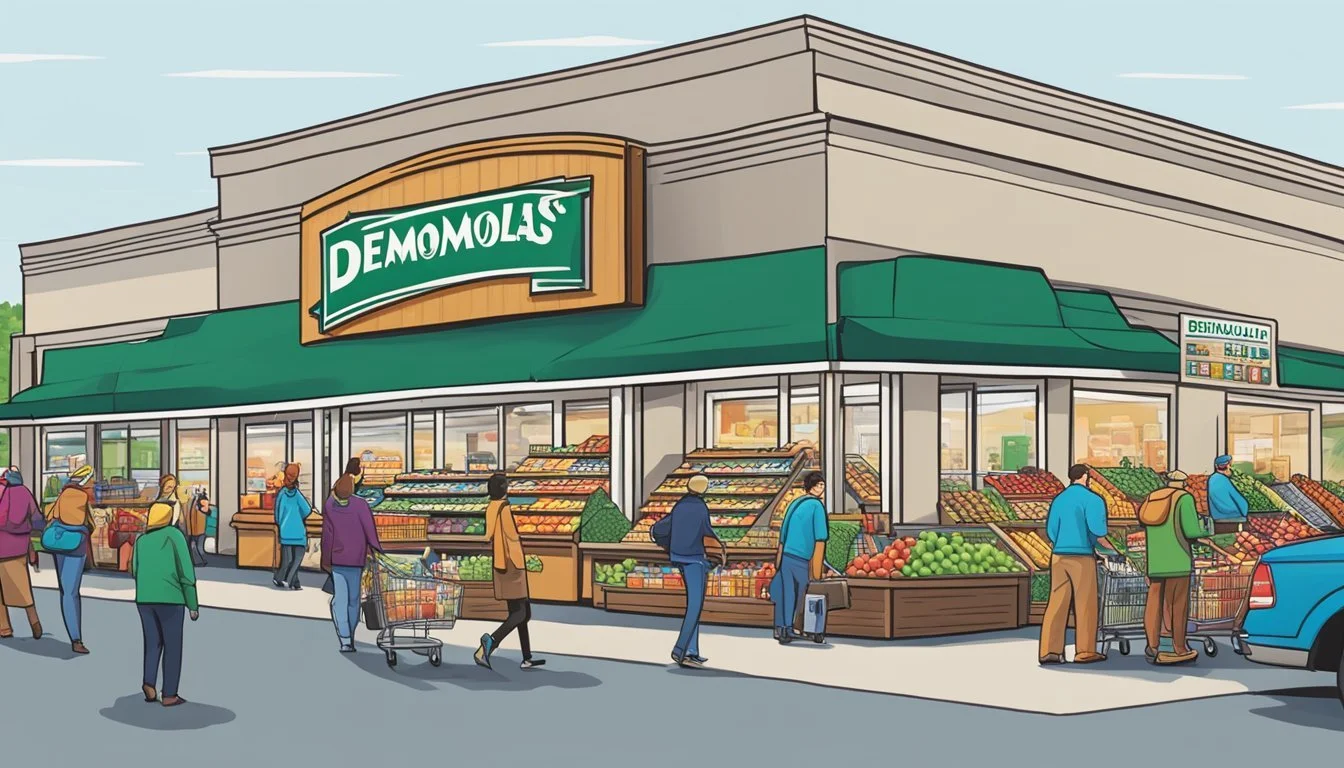Demoulas Market Basket vs Giant Eagle
Comparing Prices, Selection, and Customer Experience
Demoulas Market Basket and Giant Eagle are two prominent supermarket chains serving different regions of the United States. Both offer a wide range of groceries and household items, competing for customers' loyalty in their respective markets.
Market Basket, primarily operating in New England, has gained a reputation for low prices and high-quality products. The chain's history dates back to the 1970s, though its roots trace even further to the DeMoulas family's earlier grocery ventures. Market Basket's commitment to affordability and customer satisfaction has positioned it as a top-performing grocery store in managing inflation, according to recent consumer studies.
Giant Eagle, on the other hand, serves customers in the Midwest and Mid-Atlantic regions. While both chains strive to provide value, their approaches and offerings may differ. Comparing these two supermarkets can help shoppers understand the strengths of each and determine which might better suit their needs.
History and Background
Demoulas Market Basket and Giant Eagle both have rich histories rooted in immigrant entrepreneurship and family ownership. These grocery chains grew from humble beginnings to become significant players in their respective regions.
Demoulas Market Basket Origins
The Demoulas Market Basket story began in 1917 when Greek immigrants Athanasios and Efrosini Demoulas opened a small grocery store in Lowell, Massachusetts. Their shop specialized in fresh lamb and catered to the local Greek community.
In 1954, brothers Telemachus and George Demoulas purchased the store from their parents for $15,000. They expanded the business rapidly, opening additional locations throughout New England.
The company faced internal turmoil in the 1990s due to ownership disputes within the Demoulas family. Arthur T. Demoulas emerged as a key figure, leading the company through challenging times.
Today, Market Basket operates 88 stores across New Hampshire, Massachusetts, Maine, and Rhode Island. The chain is known for its low prices and loyal customer base.
Giant Eagle Beginnings
Giant Eagle's roots trace back to 1931 in Pittsburgh, Pennsylvania. Three families - Goldstein, Porter, and Chait - joined forces to establish the Eagle Grocery Company during the Great Depression.
The founders started with just five small grocery stores. They focused on providing quality products at affordable prices to serve struggling communities.
In 1936, the company expanded by merging with OK Grocery Company, forming Giant Eagle. This strategic move allowed for rapid growth and increased buying power.
Giant Eagle introduced innovative concepts like fuelperks! rewards and GetGo convenience stores. The chain now operates hundreds of locations across Pennsylvania, Ohio, West Virginia, Indiana, and Maryland.
The company remains family-owned, with a commitment to community involvement and customer service.
Business Model and Management
Market Basket and Giant Eagle employ distinct strategies to attract customers and manage operations. Their approaches to ownership, leadership, and customer service shape their market positions and growth trajectories.
Market Basket Strategy
Market Basket operates under a unique business model centered on low prices and employee satisfaction. The company is privately owned by the Demoulas family, with Arthur T. Demoulas serving as CEO. This leadership structure faced challenges during a 2014 power struggle with Arthur S. Demoulas and the board of directors.
Market Basket focuses on offering value to customers through consistently low prices. They avoid loyalty programs or consumer credit options, instead emphasizing "more for your dollar" across all products. This approach has fostered strong customer loyalty in New England.
Employees are considered key assets. Market Basket provides competitive wages and benefits, leading to low turnover and high employee satisfaction. This strategy has contributed to the company's revenue growth and market share expansion.
Giant Eagle Operations
Giant Eagle operates as a regional supermarket chain with a more conventional business model. The company is privately held, primarily by the Shapira family. Their management structure includes a professional CEO and board of directors overseeing operations.
The retailer employs a multi-format strategy, operating supermarkets, convenience stores, and fuel stations. Giant Eagle utilizes technology for inventory management and customer service improvements. They offer a loyalty program, fuelperks+, which provides discounts on groceries and gas.
Giant Eagle has expanded beyond its Pennsylvania roots into Ohio, West Virginia, Indiana, and Maryland. The company invests in store renovations and new locations to maintain competitiveness. Their focus on fresh products and prepared foods aims to differentiate them in a crowded market.
Store Experience and Customer Service
Market Basket and Giant Eagle offer distinct shopping environments and customer service approaches. Both chains prioritize meeting consumer needs, but with different strategies and atmospheres.
Market Basket's Shopping Environment
Market Basket focuses on a no-frills shopping experience. The stores feature wide aisles and a logical layout, making navigation easy for customers. Fresh produce, deli, bakery, and seafood departments are prominently displayed, emphasizing the chain's commitment to quality perishables.
Employees are known for their helpfulness and product knowledge. Market Basket's workforce demonstrates a strong work ethic and dedication to customer satisfaction. This creates a friendly, community-oriented atmosphere that resonates with shoppers.
The chain's emphasis on value extends beyond pricing. Market Basket maintains clean, well-stocked stores, ensuring customers can find what they need efficiently. This approach has fostered strong customer loyalty among its shoppers.
Giant Eagle's Customer Engagement
Giant Eagle invests in creating a more upscale shopping environment. Stores often feature modern designs and amenities like in-store cafes or seating areas. The chain places a strong emphasis on customer service, training employees to be attentive and responsive to shopper needs.
The layout of Giant Eagle stores typically showcases specialty departments. Expansive deli, bakery, and prepared foods sections cater to customers seeking convenience and variety. Fresh produce displays are often elaborate, emphasizing the chain's commitment to quality.
Giant Eagle leverages technology to enhance the customer experience. Features like mobile apps for shopping lists and digital coupons appeal to tech-savvy consumers. The chain also offers loyalty programs and personalized promotions to reward frequent shoppers and build customer relationships.
Product Selection and Quality
Market Basket and Giant Eagle both offer extensive product selections to meet diverse customer needs. Each store emphasizes quality in its own way, with varying focuses on fresh produce, meats, and specialty items.
Quality and Variety at Market Basket
Market Basket is known for its wide range of high-quality products at competitive prices. The store's produce section features fresh fruits and vegetables, with a good selection of organic options.
Market Basket's meat department offers various cuts and types, including poultry, beef, and pork. The store also carries a diverse array of dairy products, from milk and cheese to yogurt and specialty items.
Market Basket prides itself on stocking local and regional products, supporting nearby farmers and producers. This approach often results in fresher items and unique offerings not found in other chains.
Giant Eagle's Product Range
Giant Eagle boasts an extensive selection of groceries, including both name-brand and private-label items. The store's produce department offers a wide variety of fresh fruits and vegetables, with an emphasis on seasonal offerings.
Giant Eagle's meat counter features high-quality cuts, including prime beef and organic options. The store also has a dedicated seafood section with fresh and frozen selections.
The chain is known for its comprehensive dairy section, offering a range of milk, cheese, and yogurt products. Giant Eagle also carries an array of specialty and gourmet items, catering to customers with specific dietary needs or preferences.
Giant Eagle's bakery department produces fresh bread, cakes, and pastries daily, adding to the store's appeal for shoppers seeking freshly baked goods.
Pricing and Value Proposition
Market Basket and Giant Eagle employ distinct pricing strategies to attract customers. Both chains aim to provide value, but their approaches differ in key ways.
Market Basket's Pricing Approach
Market Basket has gained a reputation for offering consistently low prices. The chain focuses on keeping costs down and passing savings to customers. In 2022, a Dunnhuby study ranked Market Basket as the top grocery store for affordability during inflation.
Market Basket's "More for Your Dollar" philosophy translates into everyday low prices rather than relying heavily on sales or promotions. This approach helps shoppers save money without the need to track weekly deals or use coupons.
The chain's ability to maintain low prices even during economic challenges has earned it loyal customers. Market Basket's pricing strategy aims to provide reliable savings across all departments, from produce to packaged goods.
Giant Eagle's Value Offerings
Giant Eagle takes a different approach to pricing and value. The chain offers a mix of competitive prices and frequent promotions. Giant Eagle's strategy includes:
Weekly sales and discounts on popular items
A robust loyalty program with personalized offers
Competitive pricing on house-brand products
Giant Eagle's fuelperks+ program allows customers to earn discounts on gas, providing additional value beyond grocery savings. The chain also offers digital coupons and promotions through its mobile app.
A price comparison of staple items reveals:
Item Giant Eagle Walmart Dozen Large Eggs $1.59 $1.08 Cheerios (box) $3.79 $2.98 Gallon of Milk $3.19 $2.78
While Giant Eagle's prices may be slightly higher on some items, the chain aims to provide value through a combination of competitive pricing, promotions, and additional perks.
Community and Employee Relations
Market Basket and Giant Eagle have cultivated distinct relationships with their local communities and employees. These connections shape each company's reputation and impact.
Market Basket: A Community Pillar
Market Basket has earned a reputation as a community-centered grocery chain. The company's strong employee loyalty became evident during a 2014 dispute when workers and customers boycotted stores to support ousted CEO Arthur T. Demoulas.
This six-week protest demonstrated the deep ties between Market Basket, its employees, and loyal customers. Workers organized picket lines and rallies, while shoppers took their business elsewhere in solidarity.
Market Basket is known for its employee-friendly practices, including profit-sharing programs and internal promotions. The company regularly supports local events and charitable causes, further cementing its role as a community pillar.
Giant Eagle's Role in the Community
Giant Eagle has established itself as an active community partner across its operating regions. The company supports various charitable initiatives and sponsors local events to strengthen ties with customers.
Giant Eagle's employee relations have generally been positive, with the company offering competitive wages and benefits. However, it has faced occasional disputes with unions representing some of its workforce.
The supermarket chain emphasizes consumer relations through loyalty programs and personalized services. Giant Eagle also promotes sustainability efforts and healthy eating initiatives to align with community values.
While not experiencing the same level of employee-driven activism as Market Basket, Giant Eagle maintains a steady presence in its local communities through ongoing engagement and support programs.
Technological Advancement and Online Presence
Demoulas Market Basket and Giant Eagle have taken divergent paths in their approach to technology and digital presence. While one maintains a traditional focus, the other has embraced digital innovations to enhance customer experience.
Innovation at Demoulas Market Basket
Demoulas Market Basket stands out for its unconventional approach to technology. The company has deliberately chosen to maintain a minimal online presence. Market Basket does not offer online shopping or delivery services.
This strategy aligns with their focus on in-store experiences and personal customer service. The company lacks a mobile app and does not use digital coupons or loyalty programs.
Market Basket's website serves primarily as an information portal. It provides store locations, weekly circulars, and basic company information. This approach emphasizes their commitment to brick-and-mortar operations.
Despite limited digital engagement, Market Basket has maintained strong market share in key areas. Their success suggests that traditional retail methods can still be effective in the digital age.
Digital Growth of Giant Eagle
Giant Eagle has embraced digital transformation to enhance customer engagement. The company has developed a comprehensive online presence to compete with e-commerce giants like Amazon.
Giant Eagle's website offers a full-featured online shopping experience. Customers can browse products, create shopping lists, and place orders for delivery or pickup. The company has also launched a mobile app to facilitate on-the-go shopping.
Digital coupons and a loyalty program are integral parts of Giant Eagle's strategy. These features aim to drive customer retention and increase sales. The company leverages technology to personalize offers based on shopping habits.
Giant Eagle has invested in in-store technology as well. Self-checkout kiosks and digital price tags improve operational efficiency. These innovations reflect Giant Eagle's commitment to blending digital convenience with physical retail presence.
Financial Performance and Growth
Market Basket and Giant Eagle have followed different financial trajectories in recent years. Their approaches to growth and fiscal management have shaped their positions in the competitive grocery industry.
Market Basket's Fiscal Standing
Market Basket has demonstrated strong financial performance despite its old-fashioned approach. The chain topped Dunnhuby's 2022 study of over 60 grocery chains, excelling in affordability and quality. This success has translated into significant market share gains.
Market Basket leads in the Boston, Manchester, and Concord metro areas. Its growth in the Boston market is particularly noteworthy, indicating robust expansion in a competitive region.
The company's financial health appears solid, though detailed figures are not publicly available due to its private ownership structure. Market Basket's ability to offer low prices while maintaining profitability suggests efficient operations and strong supplier relationships.
Giant Eagle's Market Expansion
Giant Eagle has pursued a strategy of market expansion to drive growth. The company has focused on increasing its digital presence, capitalizing on the rising trend of online grocery sales.
Recent data shows the U.S. online grocery market valued at $20.66 billion, presenting a significant opportunity for Giant Eagle. The company has invested in e-commerce capabilities to capture a larger share of this growing segment.
Giant Eagle's expansion efforts extend beyond digital channels. The company has explored new store formats and entered new geographic markets to diversify its revenue streams.
While specific financial data is limited, Giant Eagle's continued expansion suggests a stable fiscal position. The company's board has likely approved these growth initiatives based on positive projections for return on investment.
Controversies and Legal Issues
Both Market Basket and Giant Eagle have faced legal challenges and internal disputes that impacted their operations and public image.
Market Basket's Governance Challenges
The Demoulas family, owners of Market Basket, engaged in a decades-long feud that nearly destroyed the company. In 2014, Arthur T. Demoulas was ousted as CEO by his cousin Arthur S. Demoulas and the board of directors. This triggered massive employee protests and customer boycotts.
Store shelves emptied as workers refused to stock them. The chain lost an estimated $583 million in sales during the nine-week standoff. Vendors cut ties with Market Basket, damaging its reputation and supply chain.
The conflict stemmed from accusations of fraud and self-dealing. Arthur T.'s side of the family alleged that Arthur S.'s father had secretly transferred ownership of stores to himself decades earlier.
Litigation Involving Giant Eagle
Giant Eagle has faced its share of legal battles. The company was sued for alleged price-fixing of eggs in 2008. Though Giant Eagle denied wrongdoing, it agreed to a $3 million settlement in 2013.
In 2020, the chain faced a lawsuit over its mask policy during the COVID-19 pandemic. A customer with respiratory issues claimed the policy violated the Americans with Disabilities Act.
Giant Eagle has also been involved in antitrust disputes. In 2007, it paid $700,000 to settle allegations of trying to block a competitor from opening a store in Pennsylvania.
The company's employee practices have come under scrutiny. In 2019, Giant Eagle paid $1.2 million to settle claims of improperly denying overtime pay to some workers.
Conclusion and Outlook
Market Basket and Giant Eagle both offer unique strengths in the competitive grocery landscape. Market Basket's reputation for affordability and quality positions it well to meet consumer expectations for value.
Giant Eagle's focus on convenience and digital integration aligns with industry trends toward omnichannel shopping experiences. As inflation concerns persist, both chains may need to emphasize cost-saving measures and promotions.
Future success will likely depend on adapting to changing consumer behaviors. This includes expanding online ordering options, enhancing mobile apps, and optimizing in-store pickup services.
Sustainability initiatives and locally-sourced products are becoming increasingly important to shoppers. Chains that prioritize these areas may gain a competitive edge.
The grocery industry faces challenges from non-traditional competitors like Amazon and meal kit services. Established chains must innovate to retain market share.
A case study of Market Basket's 2014 employee protests highlights the importance of corporate culture and stakeholder management in the grocery sector.
Both Market Basket and Giant Eagle have opportunities for growth. Their ability to balance affordability, quality, and convenience will shape their future success in meeting evolving consumer needs.











